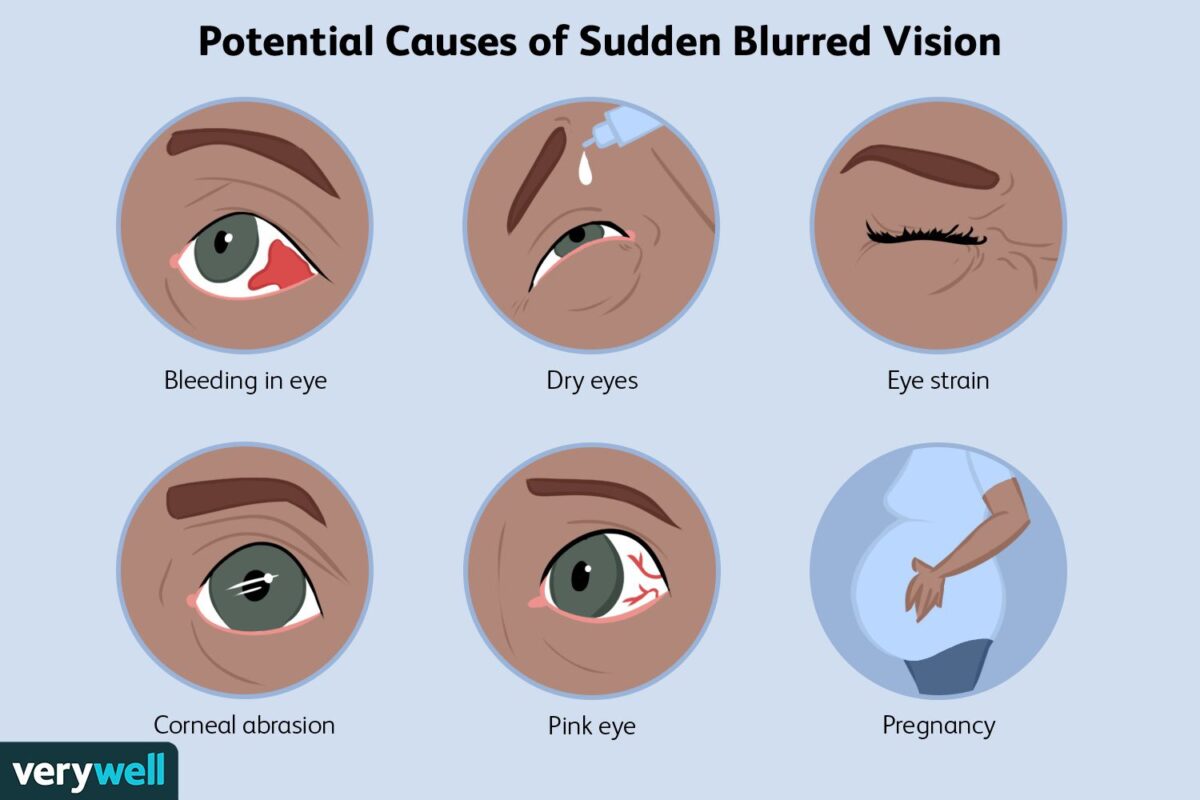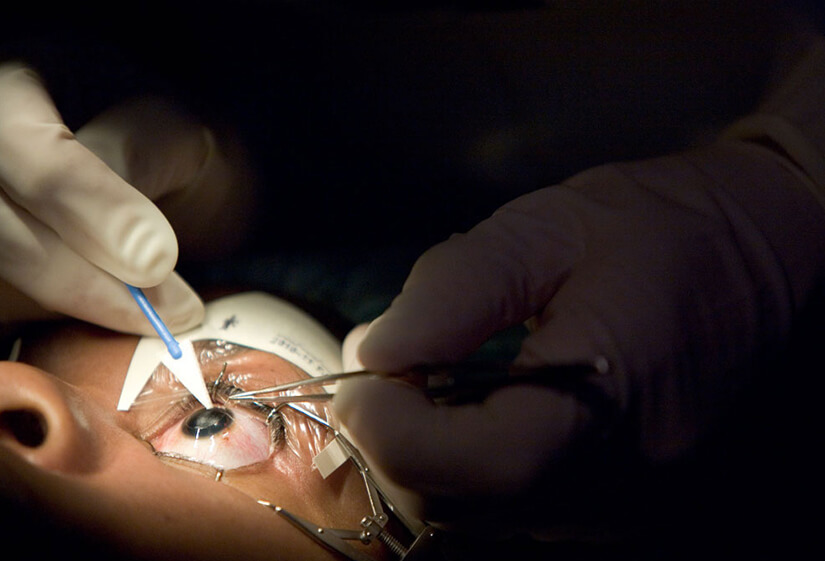Understanding Vision Changes During Pregnancy
Pregnancy is a time of immense physical and hormonal changes, many of which can impact various aspects of health. One of the lesser-discussed effects of pregnancy is the changes that can occur in vision. While many expectant mothers focus on the more obvious symptoms of pregnancy like morning sickness and weight gain, they may not be aware of the subtle effects pregnancy can have on their eyes and vision. This comprehensive guide explores the various ways pregnancy can affect vision, common causes of blurred vision during pregnancy, when to be concerned, and what steps can be taken to manage these changes.

How Pregnancy Affects the Body
Pregnancy brings about a cascade of hormonal shifts, physical adjustments, and metabolic changes. These changes help support the growing fetus but can also influence various systems in the mother’s body. One of the organs that can be affected by pregnancy is the eye. Hormonal fluctuations, fluid retention, and increased blood flow can all contribute to alterations in vision. Additionally, some pregnant women may experience preexisting eye conditions or develop pregnancy-specific complications that impact their eyesight.
During pregnancy, elevated levels of progesterone and estrogen are crucial for supporting fetal development and preparing the body for childbirth. These hormones, while essential for maintaining a healthy pregnancy, also influence many systems, including the eyes. Pregnant women may also experience changes in circulation, blood pressure, and metabolism, all of which can affect eye health. Understanding how these changes impact the body is crucial for recognizing and managing vision problems during pregnancy.
Why Vision is Impacted during pregnancy
There are several reasons why pregnancy can lead to vision changes. The body undergoes significant shifts during pregnancy, and the eyes are not immune to these fluctuations. The following factors play a role in how pregnancy affects vision:
- Hormonal Changes: Estrogen and progesterone levels increase during pregnancy, and these hormones can affect the eyes in several ways. They may cause fluid retention, changes in tear production, and changes in the cornea’s shape and thickness, all of which can impact vision.
- Increased Blood Flow: As pregnancy progresses, the body generates additional blood to meet the growing needs of the fetus, ensuring adequate oxygen and nutrients are delivered to support its development.
- Changes in the Immune System: Pregnancy alters the immune system, and while this helps prevent the body from rejecting the fetus, it can also make the eyes more susceptible to certain conditions, such as dry eyes or eye infections.
- Gestational Conditions: Pregnancy-related conditions such as gestational diabetes, preeclampsia, and gestational hypertension can also contribute to vision problems.
Common Causes of Blurred Vision During Pregnancy
There are several common reasons for blurry vision during pregnancy. Most of these are temporary and resolve after childbirth, but some may require medical attention if they indicate a more serious condition.
1. Hormonal Changes
Hormonal changes are one of the most common causes of vision changes during pregnancy. The body’s increased production of progesterone and estrogen can lead to changes in fluid balance, which may cause the cornea (the transparent layer at the front of the eye) to become thicker and more curved. This alteration can make it more difficult for the eyes to focus clearly, resulting in blurry vision. In some cases, this change may be temporary and resolve after the hormones return to normal levels post-birth.
2. Fluid Retention and Swelling
Pregnancy often leads to increased fluid retention, which can affect many areas of the body, including the eyes. The cornea, which plays a crucial role in focusing light onto the retina, can become swollen due to fluid retention. This swelling can alter the shape of the cornea and lead to vision changes such as blurriness. Additionally, pregnancy-related swelling around the eyes may cause puffiness and discomfort, further exacerbating vision problems.
3. Gestational Diabetes
Gestational diabetes is a type of diabetes that arises during pregnancy when the body is unable to produce enough insulin to meet the increased demands, leading to elevated blood sugar levels. It can cause fluctuating blood sugar levels, which may affect the blood vessels in the eyes. High blood sugar can lead to swelling of the lens, resulting in blurred vision. Gestational diabetes can also increase the risk of other eye conditions, such as diabetic retinopathy, which may cause more serious vision problems if left untreated.
4. Preeclampsia
Preeclampsia is a serious pregnancy complication characterized by high blood pressure and damage to organs such as the kidneys. One of the symptoms of preeclampsia is changes in vision, including blurry vision, seeing flashes of light, or even temporary loss of vision. Preeclampsia can be dangerous for both the mother and the baby, so it is important to seek medical attention immediately if symptoms occur.
5. Dry Eyes and Increased Eye Pressure
Many pregnant women experience dry eyes due to hormonal changes. This can result in irritation, discomfort, and blurry vision. In some cases, hormonal shifts during pregnancy can also cause increased intraocular pressure (the pressure inside the eye), leading to a condition known as ocular hypertension. If left untreated, this condition can increase the risk of developing glaucoma.

Symptoms of Pregnancy-Related Vision Changes
While most pregnancy-related vision changes are temporary, it is important to be aware of the specific symptoms that may indicate a problem. Some of the most common pregnancy-related vision symptoms include:
1. Blurry Vision during pregnancy
Blurry vision is one of the most common symptoms that pregnant women experience. It is usually caused by hormonal changes that affect the shape and thickness of the cornea. While blurry vision may be annoying, it is typically a temporary condition that resolves after pregnancy. However, if the blurry vision persists or worsens, it is important to seek medical advice.
2. Sensitivity to Light during pregnancy
Pregnant women may experience increased sensitivity to light, known as photophobia. This sensitivity can make it difficult to be in bright environments or to focus on certain objects. Light sensitivity may be caused by hormonal changes, fluid retention, or increased eye pressure. It is often temporary and resolves after pregnancy.
3. Eye Discomfort and Dryness
Pregnancy can lead to dry eyes due to hormonal fluctuations that reduce tear production. Dry eyes can cause irritation, discomfort, and even blurred vision. Women who wear contact lenses may notice this symptom more frequently. Using lubricating eye drops or taking frequent breaks from screen time can help alleviate dryness and discomfort.
4. Seeing Floaters or Spots during pregnancy
Some pregnant women report seeing floaters or spots in their vision. Floaters are tiny specks or strings that appear to float in the field of vision. While they are usually harmless, they can be distracting. However, if floaters are accompanied by flashes of light or a loss of vision, it may indicate a more serious issue, such as a retinal problem or preeclampsia. Immediate medical attention is recommended if these symptoms occur.

When to Be Concerned About Blurred Vision during pregnancy
While most cases of blurred vision during pregnancy are harmless and temporary, there are certain situations where blurred vision can indicate a more serious condition. Here are several important signs to be mindful of:
Mild vs. Severe Cases
Mild blurry vision caused by pregnancy hormones is generally not a cause for concern and will usually resolve after delivery. However, if the blurry vision is severe, sudden, or accompanied by other symptoms, such as dizziness, headaches, or changes in blood pressure, it may indicate a more serious issue, such as preeclampsia or gestational diabetes.
Dangerous Symptoms to Watch Out For
Pregnant women should seek immediate medical attention if they experience any of the following symptoms:
- Sudden loss of vision or blindness
- Flashes of light or a “halo” around lights
- Severe headaches or migraines
- Swelling or puffiness around the eyes
- Severe dizziness or fainting
These symptoms may indicate conditions like preeclampsia, retinal issues, or gestational hypertension, all of which require prompt medical care.
Diagnosis and Medical Evaluation
If you are experiencing blurry vision or other changes in your eyesight during pregnancy, it is essential to schedule an eye exam with an eye care professional. During the exam, your doctor will evaluate your symptoms, perform a thorough eye examination, and may recommend additional tests to determine the underlying cause.
Eye Exams During Pregnancy
Regular eye exams are crucial during pregnancy, especially for women with preexisting eye conditions, diabetes, or hypertension. Eye exams during pregnancy typically involve checking vision clarity, measuring eye pressure, and examining the health of the retina. Your doctor may also monitor for conditions such as diabetic retinopathy or preeclampsia, both of which can cause vision problems.
Tests to Determine Underlying Causes
Depending on your symptoms, your doctor may recommend additional tests, such as:
- Blood pressure measurement to check for hypertension or preeclampsia
- Blood sugar tests to screen for gestational diabetes
- Retinal examination to check for diabetic retinopathy or other eye conditions
Treatment and Remedies for Blurred Vision during pregnancy
While blurred vision caused by pregnancy hormones typically resolves on its own after childbirth, there are several steps you can take to manage the symptoms and maintain eye health during pregnancy.
Lifestyle Adjustments
Making simple lifestyle adjustments can help alleviate discomfort associated with blurry vision. These may include:
- Taking frequent breaks from screen time
- Using lubricating eye drops for dry eyes
- Ensuring adequate rest and hydration
- Practicing good nutrition with a diet rich in vitamins A, C, and E
Hydration and Nutrition during pregnancy
Staying hydrated is essential for maintaining healthy eye function during pregnancy. Drink plenty of water throughout the day to combat fluid retention and prevent dry eyes. A diet rich in antioxidants, vitamins, and minerals, particularly those that support eye health, can also help.
Safe Medications for Eye Care during pregnancy
While certain eye medications may be off-limits during pregnancy, there are safe options available to alleviate symptoms such as dry eyes or swelling. Always consult with your healthcare provider before using any medications or supplements during pregnancy.
Preventing Vision Problems During Pregnancy
While some pregnancy-related vision changes are inevitable, there are several strategies that can help prevent or minimize the risk of vision problems:
Regular Eye Checkups during pregnancy
Scheduling regular eye exams during pregnancy is key to monitoring your eye health and detecting any potential problems early.
Managing Blood Pressure and Sugar Levels
If you have gestational diabetes or preeclampsia, working with your healthcare provider to manage blood sugar and blood pressure levels can help prevent vision complications.
Postpartum Vision Recovery
In most cases, vision changes that occur during pregnancy will resolve after childbirth as hormone levels return to normal. However, some women may experience lingering vision problems, particularly if they had preexisting conditions like diabetes or high blood pressure.
How Long Does It Take for Vision to Normalize?
For many women, vision improves within weeks to months after delivery as hormone levels stabilize. However, it may take longer for some women, particularly those who developed gestational diabetes or preeclampsia.
Postpartum Eye Care
After childbirth, it is important to continue regular eye exams to ensure that any lingering vision issues are addressed. If you experienced any serious vision changes during pregnancy, such as retinal problems or high eye pressure, ongoing care may be required to maintain eye health.
Conclusion
Pregnancy can bring about a variety of physical changes, including changes in vision. Most vision problems during pregnancy are temporary and resolve after delivery. However, some changes may indicate more serious conditions that require medical attention. By being aware of the common causes of blurred vision, the symptoms to watch for, and how to manage these changes, you can ensure that your eyes stay healthy during pregnancy. Always consult with your healthcare provider if you notice any unusual or persistent vision changes during pregnancy.
Author Details:
Dr. Sushruth Appajigowda holds a prominent position as a Cornea, Cataract, Glaucoma, and LASIK Surgeon in Bangalore. He serves as the chief Cataract and Refractive surgeon at Vijaya Nethralaya Eye Hospital, Nagarbhavi Bangalore. Renowned as one of the finest LASIK surgeons nationwide, he brings with him over 12+ years of experience across multiple LASIK platforms, including ZEISS, ALCON, SCHWIND, AMO, and Bausch and Lomb. Having successfully conducted over 5000 LASIK procedures, Dr. Sushruth holds the title of a Certified Refractive Surgeon and a Fellow of the All India Collegium Of Ophthalmology. Furthermore, he stands as a distinguished speaker at various National and International Forums, using his expertise to guide you in selecting the most suitable procedure based on your health requirements.

http://vijayanethralaya.com/link-in-bio/
FAQs
1. Is blurry vision during pregnancy normal?
Yes, mild blurry vision is common due to hormonal changes and fluid retention. However, if symptoms worsen or are accompanied by other severe symptoms, it’s important to seek medical attention.
2. Can pregnancy affect existing eye conditions?
Yes, pregnancy can exacerbate existing conditions like diabetic retinopathy or glaucoma. Regular eye exams during pregnancy can help manage these conditions.
3. How can I prevent dry eyes during pregnancy?
Staying hydrated, using lubricating eye drops, and limiting screen time can help alleviate dry eyes during pregnancy.
4. When should I seek medical attention for vision changes?
Seek immediate medical attention if you experience sudden vision loss, flashes of light, severe headaches, or swelling around the eyes, as these could be signs of serious conditions like preeclampsia.












